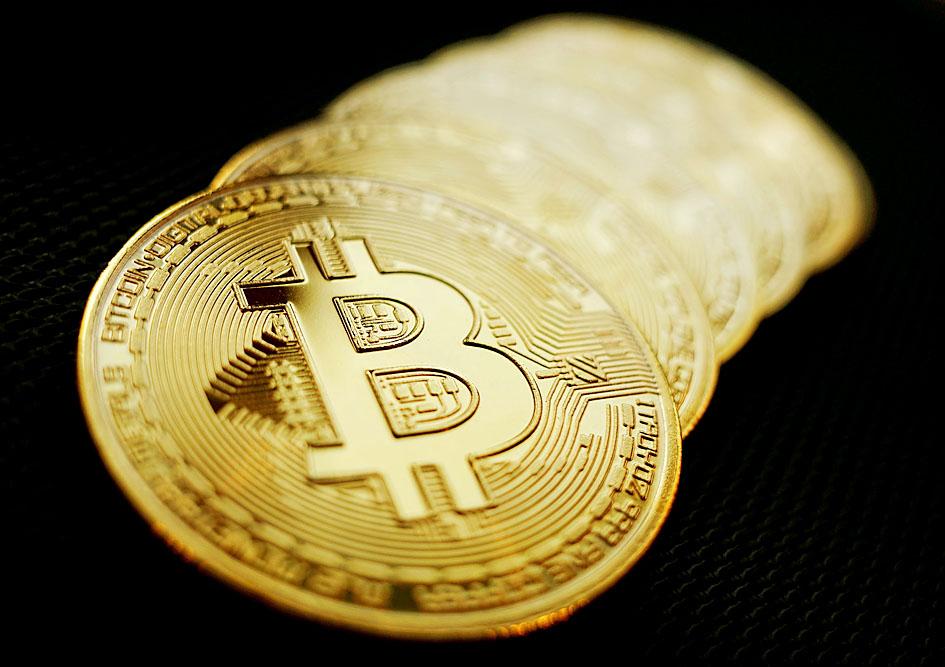Bitcoin yesterday tumbled more than 10 percent after China broadened a crackdown on its massive cryptocurrency mining industry with a ban on mines in a key southwestern province.
Chinese mines power nearly 80 percent of the global trade in cryptocurrencies, despite a domestic trading ban since 2017, but in the past few months several provinces have ordered mines to close as Beijing turns a sharp eye to the industry.
Authorities in Sichuan Province last week ordered the closure of 26 mines, said a notice widely circulated on Chinese social media that was confirmed by a former bitcoin miner.

Photo: Reuters
The price of bitcoin sank to as low as US$32,309. The unit has taken a severe hit in the past few weeks, having hit a record near US$65,000 in April, partly because of Beijing’s crackdown.
The notice reportedly instructed power companies to stop supplying electricity to all cryptocurrency mines by Sunday.
It vowed a “complete clean-up” and ordered local governments to carry out a “dragnet-style investigation” to find and shut down suspected cryptomines.
The province represents one of the largest bases for mining in the country.
A former cryptocurrency miner told reporters that they had “closed everything” in line with the requirements in the past few days.
“There have been working groups coming to check ... making sure we shut down operations and removed the machines,” he said.
Sichuan, a mountainous region in southwest China, is home to a large number of cryptocurrency mines, which require a colossal amount of energy supplied by the province’s cheap and abundant hydropower.
The closure of mines in the province has resulted in the shutting down of more than 90 percent of the country’s bitcoin mining capacity, a report in the state-run Global Times tabloid said.
Beijing has turned the screw on cryptocurrency miners to stamp out financial risks from speculation, although environmental concerns about the mines is also a factor.
Chinese media reported that electricity supply to all cryptomines across the province was stopped at midnight on Sunday, as the topic trended on social media.
Sichuan is China’s second-most intensive mining region after Xinjiang in the country’s northwest, according to Cambridge University’s Bitcoin Electricity Consumption Index.
All cryptomines in the sparsely populated but coal and hydropower-rich regions of Inner Mongolia and Qinghai were also ordered to shut down in the past few months, with citizens encouraged to report illegal mines.
Last month, the value of bitcoin dove after three Chinese financial industry bodies reasserted a ban on financial institutions from offering cryptocurrency services, warning against risky speculation by traders.
China is in the midst of a wide-ranging regulatory crackdown on its fintech sector, whose biggest players — including Alibaba Group Holding Ltd (阿里巴巴) and Tencent Holdings Ltd (騰訊) — have been hit with big fines after being found guilty of monopolistic practices.

Among the rows of vibrators, rubber torsos and leather harnesses at a Chinese sex toys exhibition in Shanghai this weekend, the beginnings of an artificial intelligence (AI)-driven shift in the industry quietly pulsed. China manufactures about 70 percent of the world’s sex toys, most of it the “hardware” on display at the fair — whether that be technicolor tentacled dildos or hyper-realistic personalized silicone dolls. Yet smart toys have been rising in popularity for some time. Many major European and US brands already offer tech-enhanced products that can enable long-distance love, monitor well-being and even bring people one step closer to

Malaysia’s leader yesterday announced plans to build a massive semiconductor design park, aiming to boost the Southeast Asian nation’s role in the global chip industry. A prominent player in the semiconductor industry for decades, Malaysia accounts for an estimated 13 percent of global back-end manufacturing, according to German tech giant Bosch. Now it wants to go beyond production and emerge as a chip design powerhouse too, Malaysian Prime Minister Anwar Ibrahim said. “I am pleased to announce the largest IC (integrated circuit) Design Park in Southeast Asia, that will house world-class anchor tenants and collaborate with global companies such as Arm [Holdings PLC],”

TRANSFORMATION: Taiwan is now home to the largest Google hardware research and development center outside of the US, thanks to the nation’s economic policies President Tsai Ing-wen (蔡英文) yesterday attended an event marking the opening of Google’s second hardware research and development (R&D) office in Taiwan, which was held at New Taipei City’s Banciao District (板橋). This signals Taiwan’s transformation into the world’s largest Google hardware research and development center outside of the US, validating the nation’s economic policy in the past eight years, she said. The “five plus two” innovative industries policy, “six core strategic industries” initiative and infrastructure projects have grown the national industry and established resilient supply chains that withstood the COVID-19 pandemic, Tsai said. Taiwan has improved investment conditions of the domestic economy

Sales in the retail, and food and beverage sectors last month continued to rise, increasing 0.7 percent and 13.6 percent respectively from a year earlier, setting record highs for the month of March, the Ministry of Economic Affairs said yesterday. Sales in the wholesale sector also grew last month by 4.6 annually, mainly due to the business opportunities for emerging applications related to artificial intelligence (AI) and high-performance computing technologies, the ministry said in a report. The ministry forecast that retail, and food and beverage sales this month would retain their growth momentum as the former would benefit from Tomb Sweeping Day